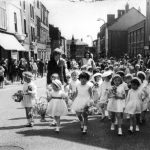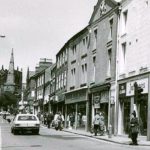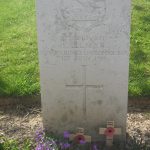Home » Articles posted by Mike Glover
Author Archives: Mike Glover
Arthur Fairbrother 1890-1916
Arthur Fairbrother 1890-1916

Arthur Fairbrother 1890-1916
Arthur Fairbrother was born in Chorley in about 1890. The youngest son of Amos and Jane Fairbrother, he spent his early years growing up in Chorley, before moving to Wigan and eventually Skelmersdale, where both he and his father worked in middle management for the Orm Weaving Company.
Arthur answered the call of his country in July 1915, joining the Royal Field Artillery as one of the many volunteer soldiers inspired by the recruiting campaigns that were famously spearheaded by Lord Kitchener. Assigned to 151st (Howitzer) Brigade the office worker turned soldier left home for training on Salisbury Plain, where he would stay until 29th November 1915, when an early morning start signalled deployment overseas.
The unit left Larkhill Camp at 4am bound for Southampton, where they would board the SS Inventor for their journey to France. It was on this voyage that Arthur got both his first sense of the danger he would face and the first taste of rations that he would, for the foreseeable future, be living on.
“Left Southampton at 4.30pm,” he writes in his diary. “All men had to wear lifebelts during the voyage as a precaution should the boat be sunk or damaged by hostile ships. We were escorted by two torpedo boat destroyers who never lost sight of the valuable cargo of men, horses and arms.”
“On this day we made our first acquaintance with Army biscuits, but as we were hungry, we got them down with the aid of some so called tea, which, in my opinion was good water spoiled.”
The 151st Brigade spent the next two weeks marching across France to St Ouen and making preparations to take their first active role in the war, by the 16th they were ready to move into the ‘firing line’ for the first time. The unit spent the first six days in the firing line making improvements to the unfinished gun pits that they had inherited, before, on the 22nd, “we fired our guns for the first time in France, giving the Germans 70 rounds of 4.5 shells on their frontline trenches.”
The unit spent Christmas 1915 at the front, an experience that was far from the family Christmases many of the men at home had been used to. “We had stew for dinner and biscuits and jam afterwards. I think the cook must have forgotten the time, for we did not get our Xmas pudding until 3pm. However I think we all enjoyed the little bit we got, and we thanked the senders (Daily News) for the only reminder of Xmas we had in the foodline.”

Arthur Fairbrother’s sweetheart Wyn
On Boxing Day Arthur found the time to write to his sweetheart Wyn (Winifrede), who like many wives, girlfriends, mothers and fathers was anxiously awaiting news of loved ones from the front. His brief letter, written on what appears to be a blank receipt from a retailer in Paris, due apparently to a lack of writing materiel, can be seen pictured with this article.
The unit was pulled out of the front line on 28th December and enjoyed a relatively peaceful New Year, with the Officers putting on a show of sorts for the enlisted men. “At night we were ‘entertained’ by the Officers and had a good show under the circumstances,” writes Arthur. “Afterwards we adjourned to another room and held an impromptu concert and were handed oranges, cake, sweets, cigarettes and coffee. Under the circumstances it was a very good show.”
On 10th January 1916 the 151st were once again ordered to the firing line, with positions being occupied on the 12th and their arrival being greeted by immediate fire from the German artillery. “We began to feel ‘quaky’ as it was our first time under enemy shell fire,” says Arthur. “However we got into the gun pits at about 8pm. A few minutes later a salvo came very near to where our horses were stood, shrapnel killed two horses instantly and one man was hit in head and legs, two others were blown out of their saddles – shock resulting- and it left us with three men in hospital.”
The unit would spend the next few months moving in and out of these positions, sporadically exchanging fire with German artillery and shelling the enemies front line trenches, although as in most places on the Western Front a large portion of Arthur and his comrades time would be spent digging, sandbagging and otherwise improving or repairing their positions, with work parties an almost daily occurence, as a typical diary entry from 20th April indicates. “Built our dugouts up again, and later in the day fired 50 rounds on an enemy battery. At night the enemy shelled well over our position.”

A pre-war portrait of Arthur Fairbrother
Of course these periods of relative quiet were punctuated by periods of intense activity, with the unit being called into action for a number of large scale bombardments. On 16th January for example the unit came under heavy bombardment, which Arthur describes vividly in his diary.
“They gave no mercy and we were like rats in a hole, some had not time to get to the ‘Bomb and shell proofs’ and took their chance in their dugouts, lying on the floor. I was in a dugout far away from the others which we used for writing. I got down against the thickest part of the side and lay with my blankets over my head. I was terrified, for no sooner did one shall burst, another burst nearer. lt was real agony, for shells were dropping 10 yds and nearer to the dugout. Shells kept coming over and renting the valley and any minute I was imagining one or two would catch me and I should have been no more.”
On more than one occasion over the first few months of 1916 the unit was called into action to help repel German attacks and it must have come as a considerable relief to Arthur to have been granted leave back to ‘Blighty’ on June 3rd 1916. “After a very weary journey ‘Blighty’ was reached and in my particular case, ‘lovely’ Wigan came into view at 6.45pm 4th June,” he writes.
At this point in the diary Winifrede has written, “Arrived in Gathurst Sunday 5th June 3pm – to spend first leave from France.”
By now the 151st Howitzer Brigade had been reorganised and Arthur’s Battery had been reassigned to the 149th Brigade and it was to this unit that he returned after his leave. Arthur was present in the Somme region of France during some of the darkest days for the British soldiers on the Western Front and it was at Delville Wood on 15th October 1916 that he was killed during an artillery barrage.
Arthur Fairbrother is buried at Guard Cemetery, Lesboeufs, France along with over 3000 other men from Britain and the other Allied nations.

Guards Cemetery at Lesbouefs
A transcript of his War Diary was kindly donated to the Skelmersdale Heritage Society by Ann and Geoff Whalley, and it is with their kind permission that we have been able to retell Arthur’s story on the Ormskirk Bygone Times site, the original was donated to the National Archive and is held in their collections at Kew.
Ormskirk Bygone Times hold a considerable collection of information on many of the men, from Ormskirk and the surrounding area, who fought and died in both World Wars and we aim over the course of the coming months and years to tell the stories of as many of those men as possible.






